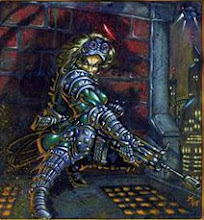The 4th Edition
So, I have finally gotten around to picking up Dungeons & Dragons, 4th edition. I am still running a D&D 3.5 campaign, which has been going strong for over a year. I've been playing since... let's see... the late 70's, not long after Advanced Dungeons & Dragons was introduced. So, I have seen a lot of versions. Below are some very preliminary thoughts on the basics of the system. There will be more entries related to this, and they will go into more detail.
This one is interesting. There are things that I think are steps in a positive direction, and some I do not like. I really like the fact that they are encouraging a point-based system for character creation, at least as far as stats go. Since the beginning of the game, too much of how good your character ended up being was dependant on the luck of those first rolls. Similarly, giving every class standard hit points at each level makes creating characters along a certain concept easier. No longer will your fighter fall down easily due to a couple of bad hit point rolls. You can conclusively predict how many hit points he will have at each level going forward.
However, they have completely changed the magic system, which was one of the things that always made D&D relatively unique. I think that the current system (abilities that can be used at will, once per encounter or once per day) is strong in some ways, but feels less like the D&D that I always enjoyed playing. Not to say that this system destroys D&D as a game, but for those of us who have been playing for years, it makes it feel less like the system that brought many of us into the RPG hobby.
Another change that is interesting and has pluses and minuses is the idea of all rolling happening by the acting character/object. In the old days of D&D, you used to cast a Fireball, and everyone in the area had to make a saving throw to avoid taking some of the damage, then you rolled dice to determine that damage. In the new system, rather than those in the area making a defensive roll, they all have defensive ratings based on their attributes, and you have to beat those ratings with your attack roll. Quite often, for area-based effects, you still do partial damage on a miss, as long as your target is in the area of effect. This is interesting, and has a real strength in that it lets the players determine the results of their own actions. It also has a couple of drawbacks - again, it feels a little less like D&D, also, it means that when you cross an oil slick, rather than you making a roll to keep your feet, the oil slick makes an "attack roll" to try to make you fall. There is a little bit of a weird mind set there - the oil attacks you? Lastly, as a long time DM, it makes it harder for me to cheat.
As anyone who runs these games knows, sometimes battles don't go the way they "should." Whether that means that an encounter that was not supposed to be challenging for the Players is about to kill them all, or that an encounter that was supposed to be climactic conflict is about to go south, because despite having an 80% chance to resist the spell that a player just cast on them, all of the big bad's 10 henchmen managed to fail the save. This is the kind of time where as a GM, I will cheat (often called "fudging" when the GM does it). Either for or against the players, depending on the situation, and what I think tells the best story. With this new system, it is harder to do so. The players are responsible for the resolution of their actions, with no stop-gap measure for me to adjust things accordingly. I haven't written any adventures for 4th edition yet, so I have no idea if it is easier to balance things so those things are less likely to happen or not.
I'll keep you posted.
Labels: Dungeons and Dragons, Review, RPG


0 Comments:
Post a Comment
<< Home